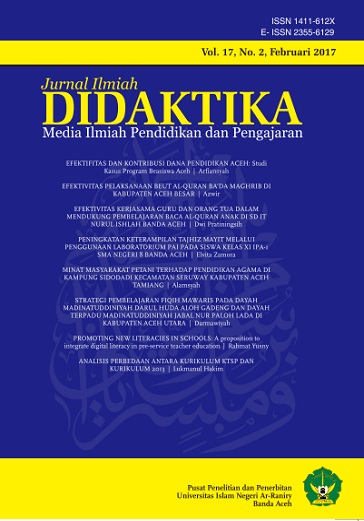LEARNING STRATEGY: IDENTIFYING STRATEGY USED BY LANGUAGE LEARNERS (FOR TOEFL, IELTS, AND GLOBAL ENGLISH LEARNERS)
DOI:
https://doi.org/10.22373/jid.v18i2.3240Keywords:
Language learning strategy, English Proficiency.Abstract
English proficiency test is the most widely taken for many purposes. Most of people take TOEFL, IELTS, and global English as learning fields to achieve their learning purposes. However the score for these proficiency tests are low. Consequently, they need to find solution to increase the score, for instance using learning strategies. There are several language strategies can be used to help them to achieve it. This study focuses on identifying which strategies used by language learners for learning IELTS, TOEFL, and global English and the frequency of using the strategies. The study proposes two research questions, first, what are strategies mostly used by the language learners in learning IELTS, TOEFL, and global English? Second, how often do the learning strategies used by the learners? The study is conducted in descriptive statistics, collected the data through SILL questionnaires consist of 35 statements, and includes 27 respondents from Bandung, West Java. This study found that learners used the learning strategies to help them in learning language proficiency, however they used it instability and inconsistency. Overall, to achieve the learning purposes, learners are suggested to trigger themselves to use learning strategies in consistent and regularly.References
Arulselvi, M. E. (2016). LEARNING STRATEGY TRAINING IN ENGLISH TEACHING. i-manager’s Journal on English Language Teaching, 6(1), 1-7.
Chamot, A. U. (2004). Issue in Language Learning Strategy Research and Teaching Electronic Journal of Foreign Language Teaching, 1(1), 14-26. doi: http://e-flt.nus.edu.sg/.
Chamot, A. U. (2005). Language Learning Strategy Instruction: Current Issue and Research. Annual Review of Applied Linguistics 25, 112-130. doi: https://doi.org/10.1017/S0267190505000061.
Cheng, H.-Y. (2015). Effects of Language Learning Strategies and Learners’ Motivation on Students’ Learning Achievement. International Journal of English Language Education 3(2).
Dörnëy, Z. (2005). The Psychology of The Language Learners. New Jersey, London: Lawrence Elrbaum Associted, Inc.
ETS. (2016). How to Prepare for The Next Generation TOEFL Test and Communicate Competence
Georgescu, C. U. C. A. (2012). Learners' Strategies in Language Learning Procedia Social and Behavioral Sciences(46), 5000-5004. doi: 10.1016/j.sbspro.2012.06.375.
Griffiths, C. (2003b). Language learning strategy use and proficiency: The relationship between patterns of reported language learning strategy (LLS) use by speakers of other languages (SOL) and proficiency with implications for the teaching/learning situation. Doctor of Philosophy University of Auckland .
Griffiths, C. (2010). Strategies of Successful Language Learners. JELS, 1(3), 1-18.
Griffiths, C. (Ed.). (2008). Lessons form Good Language Learners. United States, New York: Cambridge University Press.
Guun, V. (2007). Approaches to Small Group Teaching and Learning. University of Glasgow: Learning and Teaching Center, University of Glasgow.
Ho, G. A. L. (2011). Understanding Good Language Learners of Vietnameseas a Foreign Language. Electronic Journal for Foreign Language Teaching, 8(2), 392.
IELTS. (2017). IELTS: Demographic Data 2015 .
Jordan, C. G. D. (2005). Strategies for Success in IELTS.
Maalouf, J. P. (2016). Introduction to descriptive statistics.
Mahalingam, K. (2016). Good Language Learners and Their Strategies: An Insight. [Proceeding]. Proceeding of ICECRS, 1(2016), 359-366. doi: http://dx.doi.org/10.21070/picecrs.v1i1.504.
Mahmud, M. (2014). The EFL Students’ Problems in Answering the Test of English as a Foreign Language (TOEFL): A Study in Indonesian Context. Theory and Practice in Language Studies,, 4(12), 2581-2587. doi: 10.4304/tpls.4.12.2581-2587.
Mattarima, K. (2011). Learners’ Motivation and Learning Strategies in English Foreign Language (EFL) in Indonesian Context. Journal of Edupres, 1, 100-108.
Oxford, R. L. (1996). Employing a Questionnaire to Assess The Use of Language Learning Strategies. Applied Langauge Learning, 7(1), 22-45.
Oxford, R. L. (2003). Language learning styles and strategies: An overviewlearning style and strategies: Oxford, GALA.
Postholm, M. B. (2010). Self-Regulated Pupils in Teaching: Teachers’ Experiences. Teachers and Teaching: Theory and Practice, 16(4), 491-505. doi: http://www.tandfonline.com/loi/ctat20.
Ruba, H., Habiba, U., Amir, A., Aslam, A., & Kiran, S. (2014). Strategy Inventory for Language Learning European Journal of Psychological Research, 1(1), 10-27.
Sungatullina, D. D. (2016). Metacognitive Awareness of TOEFL Reading Comprehension Strategies. EPRA 2015. doi: 10.1051/shsconf/20162601046 SHS Web of Conferences 26.
Surgenor, P. (2010). Large and Small Group Teaching. UCD Dublin.
Zhengdong, G. (2009). IELTS Preparation Course and Student IELTS Performance: A Case Study in Hong Kong. RELC, 4(1), 23-41. doi: 10.1177/0033688208101449.






